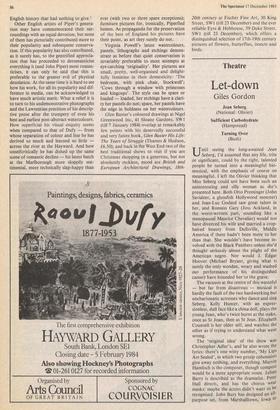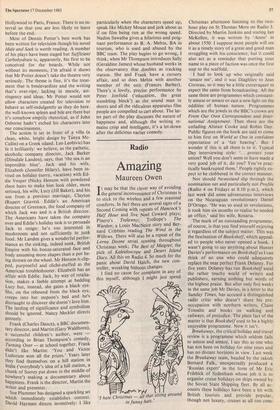Theatre
Let-down
Giles Gordon
Jean Seberg (National: Olivier) Sufficient Carbohydrate (Hampstead) Turning Over (Bush) Until seeing the long-awaited Jean Seberg, I'd assumed that any life, trite or significant, could by the right, talented people be turned into a meaningful bio- musical, with the emphasis of course on meaningful. I left the Olivier thinking that Miss Seberg could not have been such an uninteresting and silly woman as she's presented here. Both Otto Preminger (John Savident, a ghoulish Hollywood monster) and Jean-Luc Godard saw great talent in her, and Romain Gary (Joss Ackland, in the worst-written part, sounding like a menopausal Maurice Chevalier) would not have divorced his wife and married a crop- haired beauty from Dullsville, Middle America if there hadn't been more to her than that. She wouldn't have become in- volved with the Black Panthers unless she'd thought seriously about the plight of the American negro. Nor would J. Edgar Hoover (Michael Bryant, giving what is surely the only wooden, weary and washed out performance of his distinguished career) have hounded her to the grave.
The vacuum at the centre of this wasteful — but far from disastrous — musical is hardly the fault of the two hardworking but uncharismatic actresses who dance and sing Seberg. Kelly Hunter, with an expres- sionless, dull face like a china doll, plays the young Jean, who's twice burnt at the stake, once as St Joan, then as St Jean. Elizabeth Counsel' is her older self, and watches the other as if trying to understand what went wrong.
The 'original idea' of the show was Christopher Adler's, and he also wrote the lyrics: there's one witty number, 'My Lips Are Sealed', in which two gossip columnists give away nothing, and everything. Marvin Hamlisch is the composer, though compost would be a more appropriate noun. Julian Barry is described as the dramatist. Peter Hall directs, and has the chorus wear masks: maybe the actors didn't want to be recognised. John Bury has designed an all- purpose set, from Marshalltown, Iowa to
Hollywood to Paris, France. There is no in- terval so that you are less likely to leave before the end.
Most of Dennis Potter's best work has been written for television though his novel
Hide and Seek is worth reading. A number of his plays have been staged but Sufficient Carbohydrate is, apparently, his first to be
conceived for the boards. While not without its moments, I'm afraid it shows that Mr Potter doesn't take the theatre very seriously. The theme is fine, it's the treat- ment that is boulevardiste and the writing that's over-ripe, lacking in muscle, ast- ringency and ideas. Mr Potter would not allow characters created for television to behave as self-indulgently as they do here. the well-known spleen and bile are there but it's somehow emptily rhetorical, as if John Osborne hadn't etched his characters into our consciousness.
The action is set in front of a villa (a clean, white, bright design by Tanya Mc- Callin) on a Greek island. Leo Leobivici has lit it brilliantly: we believe, as the pathetic, alcoholic company director, Jack Barker (Dinsdale Landen), says, that 'the sea is an impossible blue'. Jack and his wife, Elizabeth (Jennifer Hilary), have been in- vited on holiday (sorry, vacation) with Ed- die Vosper (Nicky Henson with powdered chest hairs to make him look older, more serious), his wife, Lucy (Jill Baker), and his son from a previous marriage, Clayton (Rupert Graves). Eddie's an American director of Greenace, the food company of which Jack was and is a British director. The Americans have taken the company over and Eddie's holiday task is to persuade Jack to resign: he's too interested in mushrooms and not sufficiently in junk food. Mr Landen gives a wonderful perfor- mance as the sinking, indeed sunk, British Empire with his booze-saturated face and body assuming more shapes than a pot be- ing thrown on the wheel. Mr Henson is clip- ped, purposeful and cliche-stuffed as the American troubleshooter. Elizabeth has an affair with Eddie. Jack, by way of retalia- tion, makes a feeble attempt at bedding Lucy but, instead, she gains a black eye. She, on the rebound from the black eye, creeps into her stepson's bed and he's distraught to discover she doesn't love him. The larding of significance and symbolism should be ignored. Nancy Meckler directs genteely.
Frank (Charles Dance), a BBC documen- tary director, and Martin (Gary Waldhorn), a successful children's author, were according to Brian Thompson's comedy, Turning Over — at school together. Frank didn't like Martin: 'You and Victor Ludorum won all the prizes.' Years later they find themselves on a hill station in India ('everybody's idea of a hill station, a chunk of Surrey put down in the middle of nowhere') making a documentary about happiness. Frank is the director, Martin the writer and presenter.
Sue Plummer has designed a sparkling set which immediately establishes context. David Hayman directs inventively: I like particularly when the characters speed up, speak like Mickey Mouse and jerk about as if on film being run at the wrong speed. Nadim Sawalha gives a hilarious and poig- nant performance as B. A. Mehta, BA in tourism, who is used and abused by the BBC team. The play begins to go wrong, think, when Mr Thompson introduces Sally (Geraldine James) whose husband works in the observatory that doubles as tracking station. She and Frank have a cursory affair, and so does Mehta with another member of the unit (Frances Barber). There's a lovely, precise performance by Peter Jonfield ('education, the great stumbling block') as the sound man in shorts and all the ridiculous apparatus film people are compelled to cart about. The lat- ter part of the play discusses the nature of happiness and, although the writing re- mains crisp and intelligent, it's a let-down after the delicious earlier comedy.







































































 Previous page
Previous page